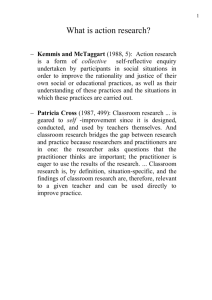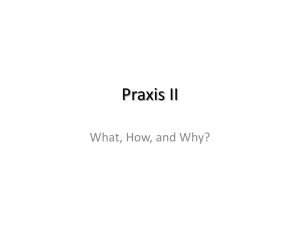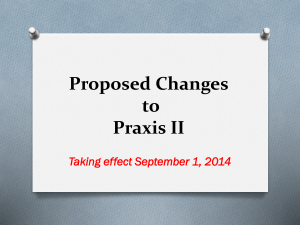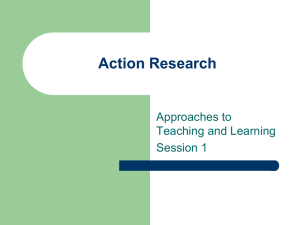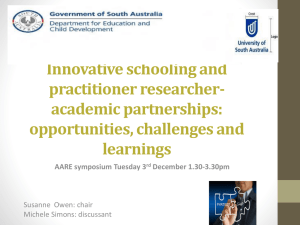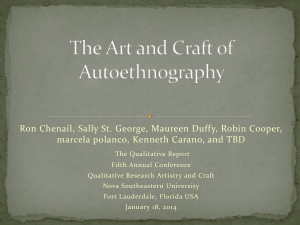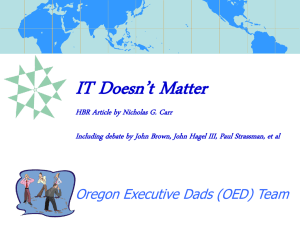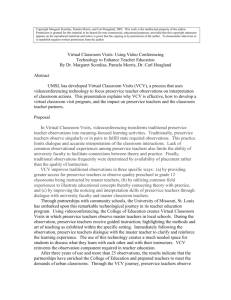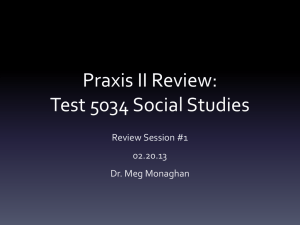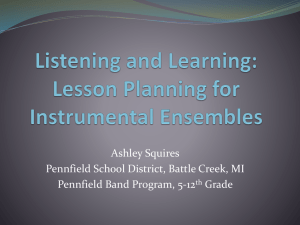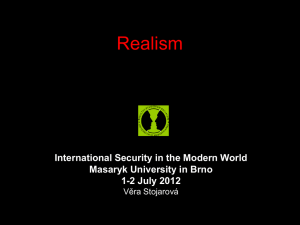NMSU Action Research - International and Border Programs
advertisement
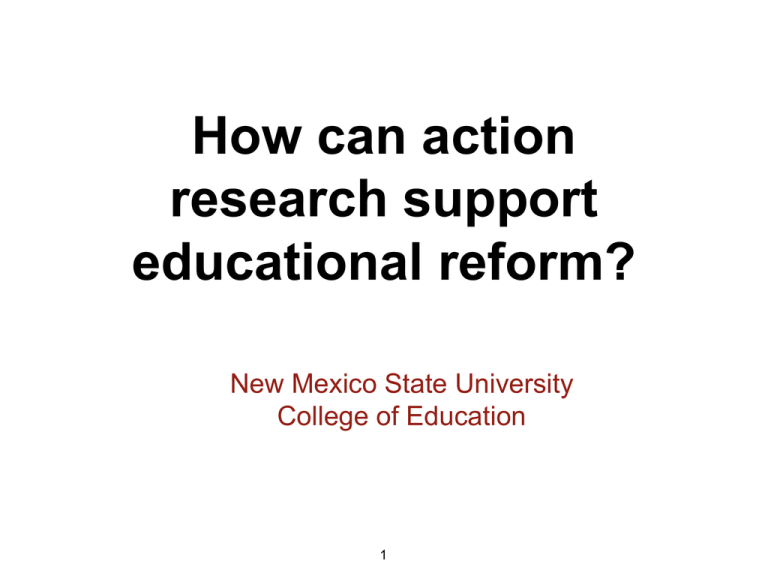
How can action research support educational reform? New Mexico State University College of Education 1 Three Perspectives of Action Research Activity Perla Barbosa - A Doctoral Student who meets with preservice teachers to ask critical questions about practice Dr. Jessica Blanchard - A Middle School Teacher whose dissertation action research investigation in the classroom examined a methodology of systematic study and loving practice Dr. Candace Kaye – Graduate Faculty whose graduate students use the action research process for their exit required comprehensive examination Preservice Teachers’ perceptions on their learning to teach and teaching for learning: An Epistemological Breakthrough Perla Barbosa Doctoral Student Literacy, Language & Culture Department of Curriculum & Instruction College of Education New Mexico State University 3 Teacher Education THE REFORM STARTS WITH CONSCIENTIZATION (Freire, 1970) TOWARDS HOW TEACHERS UNVEIL THE SYSTEM AND DEVELOP THEIR CLASSROOM PRACTICES -Dialogical and Dialectical interactions. My work with Preservice Teachers in the Secondary Education Program 1. What’s my role? University supervisor on preservice teachers’ practicum. 2. What do I do? I observe practicum students ONCE in situ, provide them written feedback and scores according to a form developed by the College of Education. 3. What is the practicum students’ role? To fulfill a required 42 hours at their site by shadowing their co-op teacher and developing mini-lessons and whole group lessons. Some courses require a whole week of teaching called ‘lesson in a series’. 4. Striving for working through a critical perspective lenses by sharing constructive written feedback, cultural circles and written surveys. Is this an effective/formative model in which preservice teacher develop critical thinking on educational structure? or Is it a roadblock to teachers’ coming to conscientization? Are we perpetuating the “banking approach of education” through our own practices as teacher educators? 4 Teacher Education Stage I - Developing awareness on one’s own conditions as educators with four preservice teachers How do preservice teachers’ make meaning on their learning process as they learn to become teachers? … (1)To consider what they understand about the school structure and this structure shapes their practices? (2)To consider the bodies of knowledge they develop throughout their practicum to navigate in the classroom (teaching, learning and environment)? 5 Teacher Education Stage II- Reframing one’s own ways of “reading” their learning process within a specific context (conscientization) What will the group (I am part of the group - emic and etic perspectives) learn from this process? (1)About the strengths and weaknesses of the current model of evaluation? (2)About school structure and classroom relationships? (3)About the role of coursework on their practicum? (praxis) (4)About ourselves? 6 Teacher Education Stage III- An Epistemological breakthrough: Dialoguing for individual and collective understanding and actions What does the group plan to do with the knowledge they developed throughout the process? (1)Can they modify/improve their instruction within the constraints of institutional norms? (see the transdisciplinary approach of teaching) (2)Can they find procedures (language=discourse strategies) to negotiate the way they envision to teach with their co-op teachers? (3)How can they make their own connections between the college coursework and their practicum? (4)How does this research experience contribute for their self-perceptions as professional and humans, and perceiving the “Other” in terms of learning differences and their origins? 7 References Cammarota, J., & Fine, M. (Eds.). (2008). Revolutionizing education: Youth participatory action research in motion. New York, NY: Routledge Torres, M. N. & Reyes, L. V. (2011). Research as Praxis: Democratizing Education Epistemologies. New York, NY: Peter Lang. Carr, W., & Kemmis, S. (1986). Becoming critical: Education, knowledge and action research. Barcombe, UK: The Falmer Press. Chambers, R. (2002). Participatory workshops. London, England: Earthscan. Clandinin, D.J. (1985) Personal practical knowledge: A study of teachers’ classroom images. Curriculum Inquiry, 15(4), 361-385. Fals-Borda, O. (1985). Knowledge and people's power: Lessons with peasants in Nicaragua, Mexico, and Colombia (B. Maller, Trans.). New Delhi, India: Indian Social Institute. [If this is out of print, I have it in pdf] Fals-Borda, O. & Rahman, M. A. (Eds.) (1991), Action and knowledge: Breaking the monopoly with participatory action research. New York, NY: The Apex Press. Freire, P. (1992). Pedagogy of the Oppressed. New York, NY: Continuum. Fromm, E. (1968). The revolution of hope: Toward a humanized society. New York, NY: Harper and Row. Kumar, S. (2002). Methods for community participation: A complete guide for practitioners. Bourton, UK: ITDG Publishing. Liakopoulou, M. (2012). The role of field experience in the preparation of reflective teachers. Australian Journal of Teacher Education, 37(6), 42-54. Max-Neef, M. A. (1991). Human scale development: Conception, application and further reflections. New York, NY: The Apex Press. McTaggart, Robin (1997) (Ed.), Participatory Action Research: International Contexts and Consequences. New York, NY: State University of New York Press. Smith, S. E., Willms, D. G., & Johnson, N. A. (1997). Nurtured by knowledge: Learning to do participatory action research, New York, NY: The Apex Press. 8 Critical Love Praxis: A Methodology of Systematic Study and Loving Practice Jessica Blanchard, Ph.D. College of Education New Mexico State University Situation • Didn’t like the teacher I was becoming • Authoritarian, dehumanizing practices • “Oh! You are a teacher? You must love kids!” contradiction So, then… • What does it mean to “love” in the classroom? • How can I better my practice through love? Critical Love Praxis • Dissertation Study: Critical love praxis in a middle school classroom---Exploring the struggles, outcomes, and possibilities of loving practice through critical practitioner action research and autoethnography. (Blanchard, 2012) • Operationalization of Critical Love Ethic • Systematic study of effort(s) to build and sustain loving practice in the classroom Love Defined • Act of will, a choice (Fromm, 1956; Peck, 1978/2003; hooks, 2001) • Purposeful and sustained acts of Care, Commitment, Respect, Responsibility, Trust, and Knowledge (hooks, 2001) • Humanizing power of love (Freire, 1970, 1998; Darder, 2002; Gay, 2000; Knight, 2004) • Feminist Care Theory – paying attention, safety, reciprocity, cultural self-reflection (Cassidy & Bates, 2005; Fisher, 2001; Gay, 2000; Knight, 2004; Noddings, 2005; Rolón-Dow, 2005; Ropers-Huilman, 1998; Valenzuela, 1999) Critical Practitioner Action Research •Practitioner Action Research (Anderson et al., 2007) – study develops organically from the “inside” – researcher identifies problematic situation in her/his own setting •Participatory Action Research (Kemmis & McTaggart, 2000) – goal of study is to improve situation for all participants involved in problematic situation •Desire to examine manifestations of power-laden assumptions and behaviors within teacher-role (Brookfield, 1995; Carr & Kemmis, 1986; Kemmis & McTaggart, 2000) Through Critical Exposure and Reflection • Renew and improve practice • Legitimate teacher knowledge • Create new knowledge based on grounded selfstudy (Anderson et al., 2007; Carr & Kemmis, 1986; Kemmis & McTaggart, 2000; Strauss & Corbin, 1990) Knowing through Story • Autoethnography – a method of autobiographical writing and research used to study own experiences in order to understand and assign meaning to them or to future experiences lived in a similar or different cultural context (Clandinin & Connelly, 1994, 2000; Ellis & Bochner, 1996, 2000; Richardson, 1997, 2000) • • Inquirical process of knowing experiences Representation of experience in the context of what was, what is, and what could be (Carr, 1986; Clandinin & Connelly, 1994, 2000; Denzin, 2000; Ellis & Bochner, 1996, 2000; Polkinghorne, 1988, 1995; Richardson, 1997, 2000) • Explanatory Narrative – magnifies the manner in which human thought and action temporarily impacted the outcome of experience as remembered by the researcher (Carr, 1986; Polkinghorne, 1988, 1995) • Authorial Voice of Authority (Richardson, 1997) • Communication of Meaning – engagement with readers through accessible, plausible, evocative, and meaningful text (Ellis & Bochner, 1996; 2000; Richardson, 1997, 2000) Anderson, G. L., Herr, K. G., & Nihlen, A. S. (2007). Studying your own school: An educator’s guide to practitioner action research (2nd ed.). Thousand Oaks, CA: Corwin. Blanchard, J. A. (2012). Critical love praxis in a middle school classroom---Exploring the struggles, outcomes, and possibilities of loving practice through critical practitioner action research and autoethnography. New Mexico State University. (Doctoral Dissertation). Retrieved from http://search.proquest.com/docview/1239562124?accountid=12810.(1239562124) Brookfield, S. D. (1995). Becoming a critically reflective teacher. San Francisco, CA: Jossey-Bass Publishers. Carr, D. (1986). Time, narrative, and history. Bloomington: Indiana University Press. Carr, W., & Kemmis, S. (1986). Becoming critical: Education, knowledge, and action research. New York, NY: Deakin University Press. Cassidy, W., & Bates, A. (2005). Drop-outs and push-outs: Finding hope at a school that actualizes the ethic of care. American Journal of Education, 112(1), 66—103. Clandinin, D. J., & Connelly, F. M. (1994). Personal experience methods. In N. K. Denzin & Y. E. Lincoln (Eds.), Handbook of qualitative research (pp. 413—427). London: Sage. Clandinin, D. J., & Connelly, F. M. (2000). Narrative inquiry: Experience and story in qualitative research. San Francisco, CA: Jossey-Bass. Darder, A. (2002). Reinventing Paulo Freire: A pedagogy of love. Boulder, CO: Westview Press. Denzin, N. K. (2000). The practices and politics of interpretation. In N. K. Denzin, & Y. S. Lincoln (Eds.), Handbook of qualitative research (2nd ed., pp. 897—922). Thousand Oaks, CA: Sage. Ellis, C. E., & Bochner, A. P. (1996). Composing ethnography: Alternative forms of qualitative writing. Walnut Creek, CA: AltaMira Press. Ellis, C. E., & Bochner, A. P. (2000). Autoethnography, personal narrative, reflexivity: Researcher as subject. In N. K. Denzin & Y. S. Lincoln (Eds.), Handbook of qualitative research (2nd ed., pp. 733—768). Thousand Oaks, CA: Sage. Fisher, B. M. (2001). No angel in the classroom: Teaching through feminist discourse. Lanham, MD: Rowman & Littlefield. Freire, P. (1970). Pedagogy of the oppressed. New York, NY: Continuum. Freire, P. (1998). Teachers as cultural workers: Letters to those who dare teach. Boulder, CO: Westview Press. Fromm, E. (1956). The art of loving: An enquiry into the nature of love. New York, NY: Harper Colophon Books. Gay, G. (2000). Culturally responsive teaching: Theory, research, and practice. New York, NY: Teachers College Press. hooks, b. (2001). All about love: New visions. New York, NY: Perennial. Kemmis, S. ,& McTaggart, R. (2000). Participatory action research. In N. K. Denzin & Y. S. Lincoln (Eds.), Handbook of qualitative research (2nd ed., pp. 567—605). Thousand Oaks, CA: Sage. Knight, M. G. (2004). Sensing the urgency: Envisioning a Black humanist vision of care in teacher education. Race, Ethnicity, and Education 7, 211—227. Noddings, N. (2005). The challenge to care in schools: An alternative approach to education (2nd ed.). New York, NY: Teachers College Press. Peck, M. S. (1978/2003). The road less traveled: A new psychology of love, traditional values and spiritual growth. New York, NY: Touchstone. Polkinghorne, D. E. (1988). Narrative knowing and the human sciences. Albany: State University of New York Press. Polkinghorne, D. E. (1995). Narrative configuration in qualitative analysis. In J. A. Hatch & R. Wisniewski (Eds.), Life History and Narrative (pp. 5—23). London: The Falmer Press. Richardson, L. (1997). Fields of play: Constructing an academic life. New Brunswick, NJ: Rutgers University Press. Richardson, L. (2000). Writing: A method of inquiry. In N. K. Denzin & Y. S. Lincoln (Eds.), Handbook of qualitative research (2nd ed., pp. 923—948). Thousand Oaks, CA: Sage. Rolón-Dow, R. (2005). Critical care: A color(full) analysis of care narratives in the schooling experiences of Puerto Rican girls. American Educational Research Journal, 42(1), 77—111. Ropers-Huilman, B. (1998). Feminist teaching in theory and practice: Situating power and knowledge in poststructural classrooms. New York, NY: Teachers College Press. Strauss A., & Corbin, J. (1990). Basics of qualitative research: Grounded procedures and techniques. Newbury Park, CA: Sage. Valenzuela, A. (1999). Subtractive schooling: U.S.-Mexican youth and the politics of caring. Albany: State University of New York Press. How can action research support educational reform in a graduate program? Candace Kaye, Ph.D. Graduate Faculty Department of Curriculum and Instruction College of Education New Mexico State University Vision of Our Department We envision and enact dispositions, competencies, and pedagogies that will build and sustain social justice communities within geo-political, socio-cultural, and historical contexts. These contexts inform how knowledge is shaped and represented, transforming classrooms, schools, and communities. Action Research supports Our Departmental Vision of Social Justice Action research participants are able to participate democratically in deciding how to use the knowledge gained to engage in collective action and dialogic understanding for solving problems. By acknowledging participants’ agency and valuing their knowledge and experiences, we increase the chances that research results and experiences will be highly relevant and responsive to participants’ needs and growth, to other communities and society at large. Research and publication by colleagues, Torres, M. & Reyes, L. (2011). Research as praxis: Democratizing Overview of AR in My Graduate Program within the Department The action research projects have placed the graduate students in the driving seat of their learning, professional growth, and activism. Our Action Research Graduate Projects for Reform – Some Learnings •Action research projects have been a method to systematically explore the nature of practice and to improve it. •Action research projects have encouraged participants to become knowledgemakers, rather than merely knowledge-users. •Action research projects have used action as a means of research where planned change is implemented, monitored and analysed. •As the action research projects research proceed, wider links have been identified and included for future action. •Action research projects have begun as individual projects, but the individuals find that they work collaboratively. A Major Learning The ECED Action Research Projects have blurred the boundaries among research, education, and activism, and instead, interplayed them all! The graduate students recognize that they own the knowledge gained and through this awareness can seek action. Thank you for this opportunity from the three of us! Perla Jessica Candace
